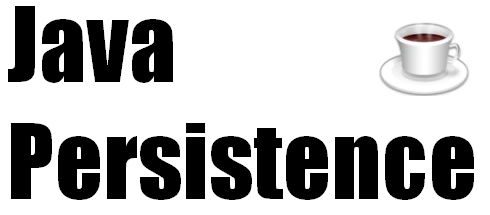
A book relating to the Java programming language.
- Preface
- About Authors
- What is Java persistence?
- What is Java?
- What is a database?
- What is JPA?
- What is new in JPA 2.0?
- What is new in JPA 2.1?
- Other Persistence Specs
- Why use JPA or ORM?
- Persistence Products, Which to Use?
- EclipseLink (Eclipse)
- Hibernate (RedHat)
- Open JPA (Apache)
- DataNucleus
- Ebean (SourceForge)
- TopLink Essentials (Glassfish)
- TopLink (Oracle)
- Kodo (Oracle)
- Mapping, Round Pegs into Square Holes
- Tables
- Identity, Primary Keys and Sequencing
- Inheritance
- Embeddables (Aggregates, Composite or Component Objects)
- Locking and Concurrency
- Basic Attributes
- Relationships
- OneToOne
- ManyToOne
- OneToMany
- ManyToMany
- Embedded
- Advanced Mappings
- ElementCollection (Embeddable Collections, Basic Collections)
- Variable Relationships (Heterogeneous, Interface)
- Nested Collections, Maps and Matrices
- Advanced Topics
- Events
- Views
- Interfaces
- Stored Procedures
- Structured Object-Relational Data Types
- XML Data Types
- Filters
- History
- Logical Deletes
- Auditing
- Replication
- Partitioning
- Data Integration
- NoSQL (and EIS, legacy, XML, and non-relational data)
- Multi-Tenancy
- Dynamic Data
- Runtime, Doing the Hokey Pokey (EntityManager)
- Querying
- JPQL
- Criteria API
- Persisting (Inserting, Updating, Merging)
- Transactions
- Caching
- Packaging and Deploying
- EJB
- Auditing and Security (User Authentication, Proxy Connections, VPD)
- Servlets and JSPs
- WebServices
- Java EE
- Oracle Weblogic
- Oracle Glassfish
- IBM Websphere
- Redhat JBoss
- Spring
- OSGi
- Tomcat
- Clustering
- Databases
- Oracle
- PostgreSQL
- MySQL
- DB2
- SQL Server
- NoSQL, EIS, and Non-relational Data Sources
- Debugging
- Performance
- Tools
- NetBeans JPA Modeler
- Eclipse JPA (Dali)
- Testing